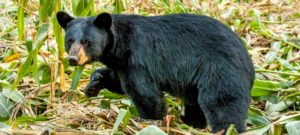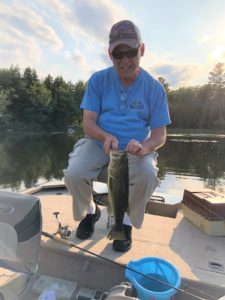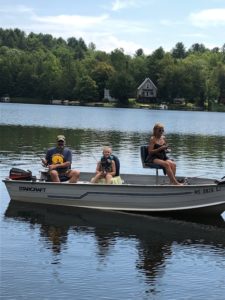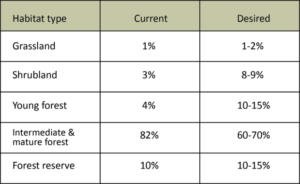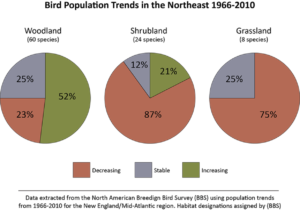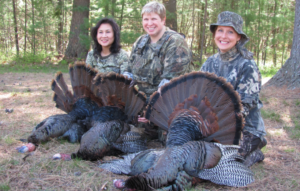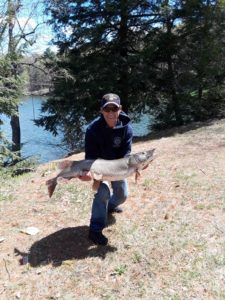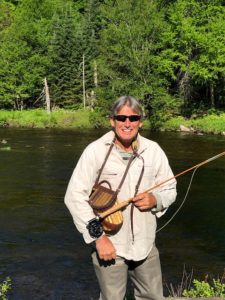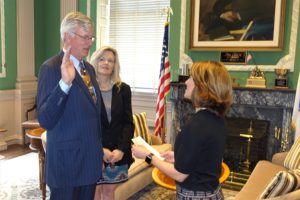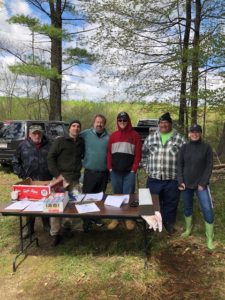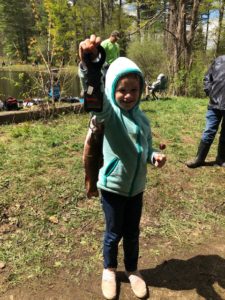How many times have you been traveling along a road and have seen the dead carcasses of deer, squirrels, salamanders, turtles, etc. which have been hit by vehicles? Any how many times have you seen such dead critters in the same location year after year? You don’t have to be a rocket scientist to figure out that the road is probably crossing their ancestral migration paths or some necessary transit way. Do you feel helpless and wish you could do something to reduce these casualties? Well, there might be.
There is a statewide, long-term, and multifaceted volunteer-based wildlife monitoring and conservation planning collaboration that involves the University of Massachusetts in Amherst, state agencies, and citizen scientists. Called Linking Landscapes for Massachusetts Wildlife (LLMW), its objectives are to: 1) reduce wildlife-vehicle collisions and improve public safety; 2) enhance, protect, and restore habitats impacted by roads; 3) control invasive species within habitats of high conservation priority; 4) incorporate conservation priorities into transportation planning; and, 5) implement wildlife transportation research projects to inform transportation and conservation decision making.
Utilizing expertise from the program partners, a research project was designed to collect information on wildlife roadway sightings and mortalities through volunteer participation. Partnering with the UMASS since 2010, The LLMW website, hosted by UMASS (http://www.linkinglandscapes.info/), features three separate databases: 1) road-crossing observations of vernal pool-breeding amphibians during spring migration; 2) turtle road crossing mortality during nesting season; and 3) all other wildlife road related mortality.
Online data forms available on the LLMW website use a Google Map interface that allows users to identify the exact location of a recorded observation and all of its associated data, including species and numbers of animals observed, date of the observation, observer name, contact information, and additional comments. Multi-year wildlife mortality observations and the presence of any rare wildlife are also recorded.
The citizen scientist volunteers documented over 3,500 mortalities representing 49 species at 1,161 locations throughout the state. Nine species of current or former state-listed salamanders and turtles were among the mortalities recorded. Sites of highest conservation need were identified and targeted by MassWildlife and MassDOT to develop on-site improvements such as new signage, enhanced culvert design, or installation of wildlife barrier fencing. One successful fencing example at the highest turtle mortality hot spot documented in the state (Littleton) reduced turtle mortality by 90%.
In addition to community engagement through citizen science, the collected data from LLMW has informed the agencies where best to install improved crossing structures and other wildlife barriers to enhance public safety and protect endangered species. The LLMW collaboration has helped the partners prioritize and implement invasive species control, and conduct habitat restoration activities on scenic uplands and calcareous wetlands that are hot spots for biodiversity.
The LLMW has engaged with community organizations to build and install nesting boxes for American kestrels, a declining species; installed and monitored peregrine falcon nesting boxes on bridges; and provided an avenue for meeting the Highway Division’s GreenDOT goal to enhance the ecological performance of MassDOT impacted land.
To prevent or reduce turtle road mortality – one of the most pernicious and devastating threats to this group of reptiles – new initiatives are providing barriers to road crossings, placing turtle crossing signs at reported high mortality areas, and enhancing culvert/bridge designs to favor turtle survival.
You can learn more about Conservation Projects at the link https://www.linkinglandscapes.info/uploads/2/8/7/8/28782453/linking_landscapes_2017_final_3-26-18_update.pdf. Also, there is a good write-up regarding this program in the Issue #3, 2014 Massachusetts Wildlife magazine if you can get your hands on one.
After reading the Summary Report, I had a few questions which I posed to David Paulson from MassWildlife. asked him if the program covers secondary roads, ie, town roads? He said that it covers all roads in MA, especially the citizen science data.
I asked him how can the general public participate? Does the general public join as a monitor, or just report a road kill?
Reporting is easy, he said, volunteer effort can be as passive as occasional observations to more intensive survey efforts (which are usually coordinated). Safety is always the priority. To submit your findings, click the major project that best fits what you see: reducing turtle roadkill, mapping amphibian crossings, or mapping wildlife roadkill. Fill out the short survey, with detailed location information. The Google Map at the bottom of the survey can be zoomed in and panned to a specific location. The information provided on the website helps MassWildlife and MassDOT determine priority areas to mitigate wildlife-human interactions and how best to manage them.
I asked him if people can sign up through the Berkshire Environmental Action Team (BEAT)? Not required, but absolutely, he said. Two organizations have been very involved with the monitoring program and deserve recognition: The Parker River Clean Water Association and our own BEAT.
Many thanks to Fish & Wildlife Board Member Steve Sears who originally brought this program to the attention of the Berkshire County League of Sportsmen in February of this year.
Basic Hunter Education Course Cancelled
In this column of August 11, I mentioned that there will be a 6-day basic hunter education course at the Pittsfield High School running nights from September 10 through September 26. Please be advised that the course has been cancelled. No word has been received as to why the cancellation or if another one is being rescheduled.
Is it time to allow crossbow hunting here in Massachusetts?
Many hunters think so. A crossbill hunting bill passed in the State Senate last year, but not the House. Sportsmen have been trying to get a bill passed in the House for years now only to see it hug up in “committee.” Now they are asking public support. The Massachusetts Conservation Alliance is spearheading this year’s effort by supporting a bill in the MA House of Representatives titled H.3866. They are joined by the Massachusetts Sportsmen’s Council, GOAL and others.
Here are some of the reasons the MCA is asking the public to support the bill:
• Crossbows are legal in 46 other states.
• MA currently allows crossbow use by disabled persons by permit. If passed, Massachusetts would join at least 32 other states that currently allow crossbow hunting for non-disabled individuals
• It allows professional managers at the DFW to regulate crossbows as they currently do for all other archery equipment
• Crossbow sales taxes would increase the Pitman-Robertson funding for conservation of both game and non-game species.
• Crossbows are quick, quiet and effective on all types of game
• Crossbow hunting increases options for hunters and wildlife managers in areas where firearms are prohibited, and populations are high.
• There are no documented cases of non-hunters being injured by archery equipment in the Commonwealth of Massachusetts.
Unfortunately, many older bowhunters have had to give up archery hunting simply because they no longer have the strength to draw a 45-50 lbs. bow anymore. (Sorry folks, it’s a fact of life.) Because crossbows are much easier to draw (load) it allows them to enjoy a few more years in the woods archery hunting.
So how can the general public and sportsfolks help? By phoning or writing your legislators asking them to vote for H.3866.
Fishing Derby
The Berkshire Hatchery Foundation in Hartsville-New Marlborough is having its next free children’s fishing derby on Saturday, September 14 from 9:00 to 10:30 am at its lower pond. Children aged 12 and under must be accompanied by an adult. This will be the last derby of the year.
Early Goose Hunting Season
The statewide Early Canada Goose hunting opened on September 3 and runs until September 20. The daily bag limit is 15 and the possession limit is 45. For more information such as type of shot, licenses required, hunting hours, etc., click onto https://www.mass.gov/files/documents/2019/05/14/MassWildlife_MigratoryGameBird-Regs_2019-2020.pd.

